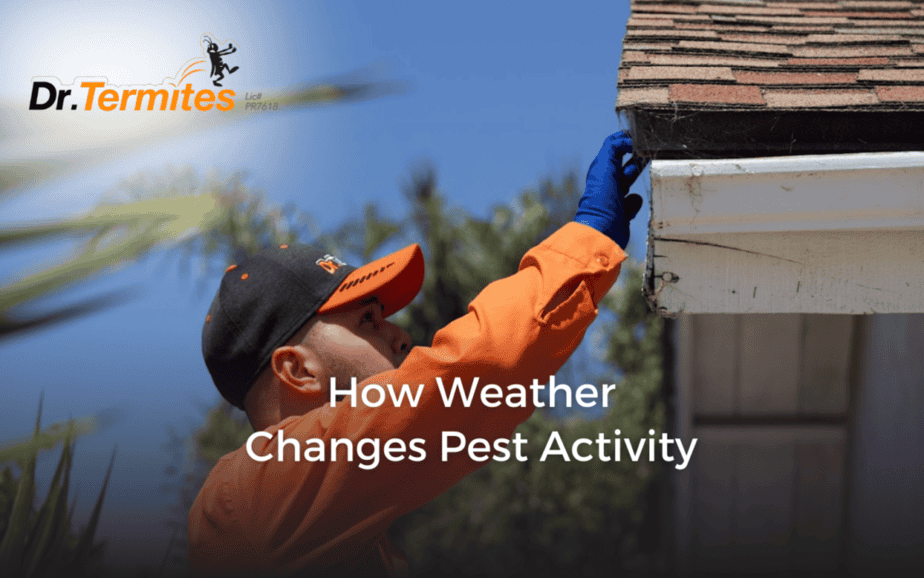
by pestcontrolseos | Nov 12, 2024 | Blog, Pest Conrol
The behavior of pests is greatly influenced by the weather. Variations in rainfall, humidity, and temperature can all affect the appearance and timing of pests. Businesses and families can better prepare for pest problems by being aware of these developments. You may take precautions to keep pests out of your house or place of business by understanding how the weather influences pest activity. Let’s examine how different weather patterns affect pest activity and talk about practical solutions for these problems.

The Impact of Weather on Pests
Warm Weather and Pest Activity
Pest activity increases as temperatures rise. Warm weather is ideal for many pests, which increases breeding and sightings. As they look for food and water, insects such as flies, ants, and mosquitoes become more busy. Additionally, warm weather speeds up insect life cycles, facilitating rapid reproduction. If not handled appropriately, this may result in infestations. During the warmer months, homeowners should be on the lookout for pests and take precautions to keep them out of their homes. Using insect repellents and placing screens on doors and windows, for instance, can help keep these unpleasant visitors out.
Cold Weather and Pest Activity
Colder weather often drives pests indoors in search of warmth and shelter. Rodents, spiders, and some insects like to find cozy spots inside homes and buildings to wait out the winter. While you might see fewer pests outside, indoor sightings can increase. Sealing entry points and maintaining a clean environment can help keep these pests at bay. Regular inspection and maintenance are key during colder months to prevent unwanted guests from settling in. It’s also useful to store food in airtight containers and keep areas like basements and attics clutter-free to minimize hiding spots.
Rainy Weather and Pest Activity
Rainy weather creates moist environments that attract many pests. Water sources can become breeding grounds for mosquitoes, and excess moisture can attract termites and ants. Heavy rainfall can also force pests like rodents to seek higher, drier ground, often leading them indoors. Ensuring proper drainage around your property and fixing leaks can reduce the appeal of your home to these pests. It’s important to monitor any changes in pest activity after heavy rains. Additionally, trimming foliage and keeping gutters clean can prevent water from accumulating and attracting pests.
Dry Weather and Pest Activity
Dry conditions can lead pests to seek water in human habitats. Lack of moisture in the environment pushes pests like rodents and insects closer to homes and businesses in search of water. This can increase sightings of pests in kitchens, bathrooms, and other areas where water is stored. Conserving water and maintaining dry conditions in and around your home can help deter pests during droughts or dry spells. Regular monitoring and upkeep remain essential. Using dehumidifiers and repairing leaky faucets can further discourage pests from seeking refuge indoors.
How to Manage Pest Activity
Seasonal Pest Control Tips
Each season brings its own pest challenges. In spring and summer, focus on outdoor spaces, removing standing water and sealing cracks. In fall and winter, pay attention to indoor spaces, ensuring that pests cannot find shelter in your home. Routine cleaning, sealing entry points, and using pest-resistant materials can help manage and reduce pest activity. It’s essential to adapt your pest control strategies to the changing seasons to stay ahead of potential infestations. For instance, regular yard maintenance and keeping firewood away from the house can prevent pests from finding entry points.
When to Call Expert Pest Control
Sometimes, the pest problem can be too overwhelming to handle on your own. If you’ve tried various methods and still face persistent pest issues, it may be time to call in expert pest control. Professionals can assess the situation and provide targeted pest control treatment to resolve the problem efficiently. They have the experience and tools necessary to tackle stubborn infestations and can offer advice on preventing future occurrences. Timely intervention can save you from bigger problems down the road. It’s also comforting to know that experts can help identify the specific pests and create a tailored plan to manage them effectively.
Prioritize a Pest-Free Environment for Your Home or Business
Weather changes can significantly impact pest activity, influencing when and where pests are likely to appear. By understanding these patterns, you can better prepare and protect your home or business. Regular maintenance, seasonal adjustments, and timely pest control treatment are crucial. Don’t hesitate to reach out to professional pest services when needed, as they can provide effective solutions and peace of mind. Staying proactive is the best way to ensure that pests don’t become a major problem. Remember, the right pest control measures can make a big difference in maintaining a pest-free environment year-round.
Don’t let pests take over your space! Contact Dr. Termites today for top-notch pest control services. Our experts are ready to provide you with the peace of mind and protection your home or business deserves. Act now for a pest-free tomorrow!
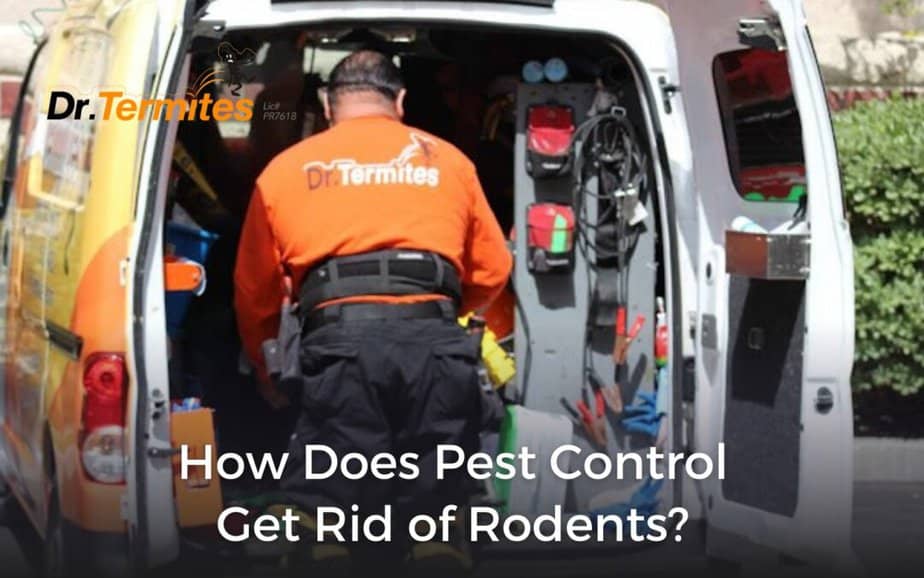
by pestcontrolseos | May 22, 2024 | Pest Conrol
Rodents in the home can be a major problem, causing damage and spreading disease. When faced with such an issue, calling in pest control professionals is often the best course of action. These experts have the skills and tools necessary to tackle the problem efficiently.
This blog post will explore what attracts rodents to homes and the methods pest control uses to eradicate them.
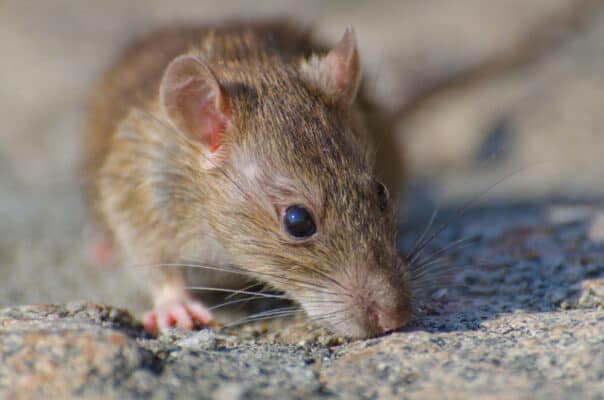
Key Factors That Attract Rodent Infestations
When dealing with the unwelcome presence of rodents in your home or business, understanding what draws them in is crucial. Several factors can make your space more inviting to these pests. Here’s a look at the primary reasons behind rodent infestations:
Food Sources
One of the main attractions for rodents is easy access to food. Leftovers, crumbs, and unsecured food containers offer a feast for pests looking for a meal. Keeping your kitchen clean and storing food in sealed containers can significantly reduce the likelihood of attracting rodents.
Shelter and Warmth
Rodents seek out warm, hidden places to nest, especially during cooler months. Cluttered areas like garages, attics, and basements provide the perfect environment for them to settle down. Reducing clutter and sealing off potential nesting sites can help deter them.
Water Sources
Like all living beings, rodents need water to survive. Leaky pipes, dripping faucets, and even pet water dishes can attract rodents searching for hydration. Fixing leaks and ensuring that water sources are not easily accessible to pests can help keep them at bay.
Easy Entry
Small cracks, holes, and gaps in your home’s exterior are all it takes for rodents to gain entry. They can squeeze through surprisingly small openings to find shelter or food. Inspecting your home’s exterior regularly and sealing off entry points is critical in preventing an infestation.
Safety
Areas that provide safety from predators will attract rodents. This includes dense vegetation, piles of wood, and cluttered storage areas. Maintaining your yard and keeping outdoor areas tidy can reduce the safety appeal your property might have for rodents.
The Basics of Rodent Control
Identifying the Problem
The first step is always to identify the problem areas. Pest control specialists conduct a thorough inspection of the home to find out where rodents are hiding and how they are entering the building.
Sealing Entry Points
Once they’ve located where the rodents are getting in, the next step is to seal these entry points. This may involve fixing holes in walls, ensuring windows and doors close properly, and blocking any other gaps that allow access.
Strategies Employed in Rodent Control
Setting Traps
One common method used is setting traps. There are various types of traps, including bait traps and snap traps, which are placed in strategic locations around the home.
Using Rodenticides
In some cases, rodenticides might be used. These are poisonous substances that kill rodents, but they must be used with caution to avoid harm to humans and pets.
Regular Monitoring
Even after it seems like the problem has been dealt with, pest control experts will continue to monitor the situation. This ensures that if any new rodents try to enter, they can be dealt with promptly.
Prevention Methods
Keeping Your Home Clean
An important part of rodent control is prevention. Keeping your home clean and free of food scraps can make it less attractive to rodents.
Proper Storage of Food
Storing food properly in sealed containers also helps prevent rodents since it cuts off their food supply.
Regular Home Maintenance
Regularly checking for and repairing any potential entry points can help keep your home rodent-free in the long run.
Waste Management
Managing waste effectively is another vital prevention strategy. Regularly disposing of garbage and using bins with tight-fitting lids can significantly reduce rodent attraction to your property.
Why Professional Pest Control?
Safety and Efficiency
Handling rodents requires knowledge and tools that most homeowners don’t have. Professionals can solve the problem more safely and quickly.
Peace of Mind
Knowing that experts have taken care of the problem provides peace of mind and ensures that your home is safe and comfortable for your family.
Winning the Battle Against Rodents: Expert Strategies for a Pest-Free Home
Dealing with rodents is no easy task, but with the help of pest control professionals, it can be managed effectively. Their approach involves a combination of identifying the problem, using various control strategies, and implementing preventive measures to keep your home safe from these unwelcome visitors. Keeping your home clean, storing food correctly, and maintaining your property are key steps you can take to support these efforts.
In the fight against rodent invasions, the path to a secure and safe home requires expert intervention. Dr. Termites stands ready to deliver the specialized pest control services you need. Our team of professionals employs proven strategies tailored to target and eliminate rodents, safeguarding your space against further infestation. By choosing Dr. Termites, you’re not just addressing the current problem; you’re investing in the future well-being of your home. Take the first step towards a rodent-free environment by contacting Dr. Termites today. Your peace of mind is just a call away.
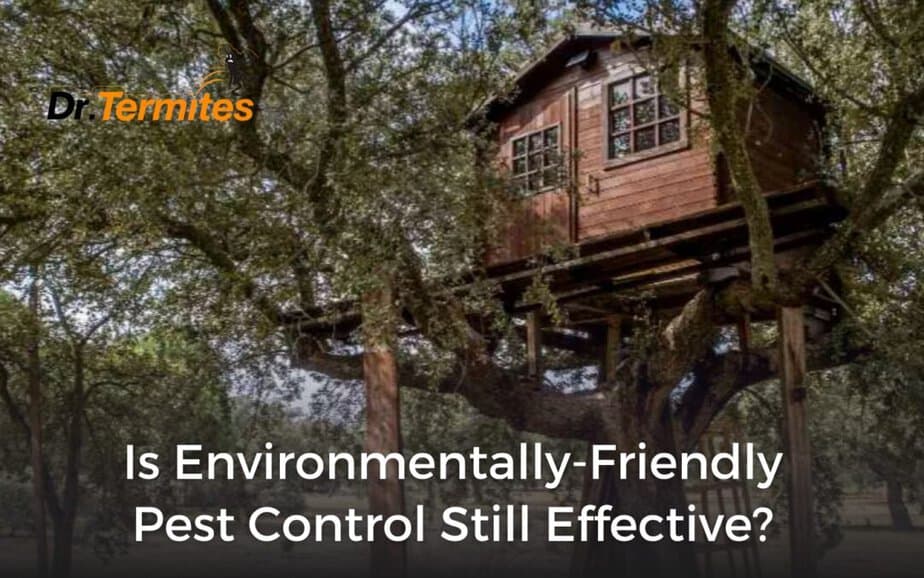
by pestcontrolseos | May 15, 2024 | Pest Conrol
It is important to keep our homes free from pests. We aim to keep our spaces clean and safe. More people now prefer using safe, green ways instead of strong chemicals. The big question is: Do these safe, green ways really keep bugs away?
In this blog, we will examine how well these methods work. We will talk a lot about using orange oil.

Eco-Friendly Pest Control Methods
Looking to nature for pest control is kind to our planet. It skips the bad chemicals and chooses safe, natural ways instead. Isn’t that good for where we live? Nature gives us things like plants, stones, or traps to stop pests safely. This way, we don’t harm animals or pollute our homes. Keeping away from harsh chemicals helps keep our surroundings clean and safe.
Why Choose Green Pest Solutions?
Picking green bug control means we choose a safe way for our homes and the earth. These nature-friendly choices reduce the risk of dangerous chemicals to our health and the environment.
Healthier Living Spaces
By using natural ingredients, green pest solutions promote a healthier living environment. They lower the chance of allergies, breathing problems, and other health issues from chemical methods to control pests.
Protecting Wildlife
Chemical pesticides often have a broader impact than intended, harming beneficial insects and wildlife. Green ways aim at pests but keep other animals safe.
Sustainable Future
Choosing eco-friendly pest control is a step towards living in a way that helps the planet. It supports all kinds of life and keeps nature balanced. This makes the earth healthier for the future.
Orange Oil as a Pest Control Solution
Orange oil has gained popularity as a powerful, natural pest fighting agent. Here’s why it stands out:
The Power of Orange Oil
Extracted from orange peels, orange oil contains a substance called D-limonene. This kills many pests like termites but is safe for people and pets. It also smells like fresh citrus fruit.
How Orange Oil Works against Pests
Orange oil treats pest issues by breaking down the exoskeletons of insects and disrupting their life cycle. It works very well against termites, keeping wood safe without using harsh chemicals.
Other Environmentally Friendly Pest Control Methods
Besides the well-known orange oil, there are numerous other strategies for managing pests in an environmentally friendly manner. These methods aim to stop pests, use natural treatments, and physical methods that do not harm the earth.
Beneficial Insects
Introducing beneficial insects into your garden or crops can naturally control pest populations. Ladybugs, for example, eat aphids, mites, and other harmful pests, making it less needed to use chemicals.
Physical Barriers and Traps
Physical barriers like nets, fences, or row covers can protect plants from being eaten by pests. Similarly, non-toxic traps can catch and remove pests from your home and garden without the use of harmful chemicals.
Natural Repellents
Certain plants act as natural repellents against pests. For example, marigolds can deter beetles and nematodes, while lavender keeps moths and fleas at bay. Planting a variety of these can safeguard your garden in a gentle way.
Cultural Practices
Changing your gardening or farming practices can also minimize pest issues. Changing crops, managing waste well, and keeping soil healthy help make your garden or farm less attractive to pests.
Integrated Pest Management (IPM)
IPM is a comprehensive approach that combines different green strategies for long-term pest control. It focuses on prevention, monitoring, and controlling pests using the least harmful methods first, moving to more aggressive tactics only when necessary.
Effectiveness of Environmentally-Friendly Pest Control
The effectiveness of green pest control hinges on the specific method and the type of pest. Generally, these methods require a bit more patience and persistence but can be just as effective as traditional chemical treatments when implemented correctly.
While success stories abound, particularly with orange oil for termite control, it’s important to recognize that not all pests can be managed as easily with eco-friendly options. Sometimes, combining several methods yields the best results.
Embracing Green Pest Control: A Path to a Healthier Home and Planet
In the fight against pests, environmentally friendly options like orange oil are proving to be not only viable but also effective. If you have a small or big pest problem, trying green ways to control pests can be safer and better for all.
At Dr. Termites, we understand the significance of sustainable living and the importance of maintaining a healthy, pest-free home. Contact us today to schedule an appointment and take a step towards a greener, healthier home free of pests.
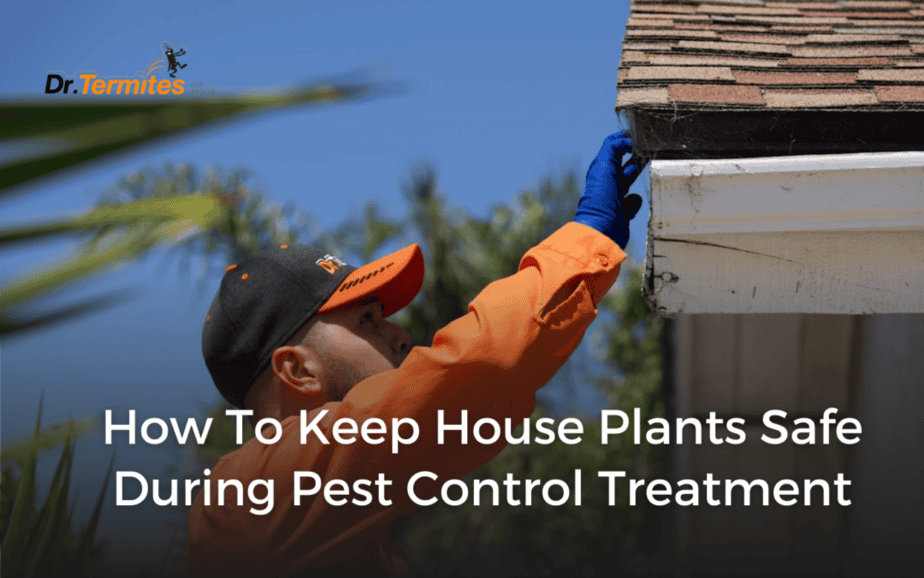
by pestcontrolseos | Apr 11, 2024 | Pest Conrol
Bringing Mother Nature inside our homes can make our living space more comfortable and beautiful. But, greenery isn’t just flowers and plants. Certain types can attract and house ants, spiders, and roaches. These creatures can be potentially harmful to plants, humans, and pets.
The best way to keep our plants and homes safe at the same time is through professional pest control treatment.
Pest control can help in maintaining a healthy and comfortable environment. They’re also safe for plants, humans, and pets when safety protocols are followed. The same experts use EPA-approved products and practice targeted application methods to minimize your exposure and maximize its effect on pests.
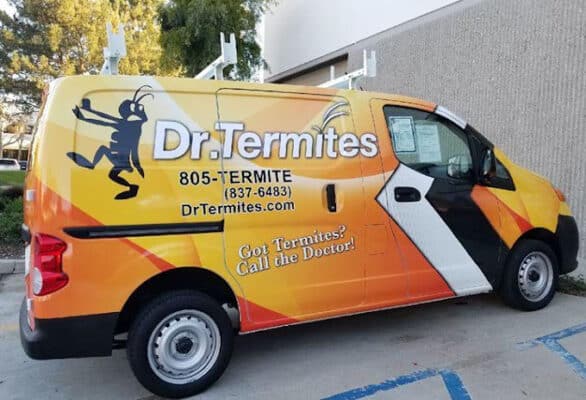
Common Misconceptions About Pest Control and House Plants
Many believe that pest control is harmful to the environment and our health. To some extent, it’s true. However, working with a seasoned veteran in the pest control industry eliminates those risks.
Here are more common misconceptions homeowners might have about the effects of pest control on houseplants.
Pest Control Is Harmful to Plants
Pest control companies now use modern products designed to target specific pests. If applied correctly, they’re generally safe for plants.
Pest Control Is Too Harsh for Delicate Houseplants
Depending on the areas affected, professionals can recommend alternative courses of action to protect your plant collection. This may include using a different but more appropriate method or a localized solution.
Plants Die If You Get Pest Control
This is not true! In many cases, keeping pests out of your home can benefit your plants. Eliminating harmful insects that can damage leaves and spread diseases is good for flowers and plants.
How to Protect Your Plants Before Pest Removal
As a homeowner, there are several steps that you can take to prepare your houseplants before the specialists arrive.
This includes:
- Make a detailed list of the types of houseplants inside your home. Let them know about any specific concerns you might have about the procedure and its potential effects on sensitive plants.
- Be open to temporarily relocating sensitive plants to safer areas while they work. In fact, suggest other suitable locations around your home if possible.
- Advise them on proper care of your houseplants during relocation.
- For plants that you can’t move, cover them with a plastic sheet or a loose cloth. Make sure they have proper ventilation. This can minimize their exposure to the chemicals without putting them at risk of bad air circulation.
- Ask pest control professionals when it’s safe to remove the covers on your houseplants, if applicable.
- Depending on the type of houseplant, you may consider watering them more thoroughly a day or two before they are exposed to the product.
- Avoid pruning or repotting your houseplants in the days before or after the scheduled date to minimize stress.
The Unexpected Benefits of Pest Control for Healthy Plants
Believe it or not, pest control is beneficial for houseplants.
These are some of the direct and indirect benefits of a pest-free home for your plant babies:
- Elimination of Plant Pests – Mealybugs, aphids, and spider mites are fatal to plants in cases of severe infestations.
- Improved plant health – By eliminating pests, your plants can focus on growing healthy without disease.
- Long-term plant protection – With proper application, the right chemicals can create a barrier around your home. This protects you, your family, your pets, and even your plants from future pest infestations. This promotes a healthier indoor environment for your entire dwelling.
Work Only With Reputable Pest Companies
When looking for a reputable and licensed contractor, you should prioritize the following considerations:
- Certifications and licensing
- Positive customer reviews
- Use of EPA-approved products
- Proper safety practices
Furthermore, the right partner will have no trouble answering your questions and concerns. If anything, they will encourage you to let them know about your current home situation. This is what allows them to give better recommendations best suited for your houseplants and their needs.
But, as a homeowner, you also have a set of responsibilities. You need to follow all pre-treatment and post-treatment instructions carefully.
By keeping an open and clear line of communication, you can minimize the risk of the procedure on your houseplants.
Conclusion
Your home is a sanctuary. It’s your private abode. It’s where you should be most comfortable. The presence of pests can change this. If you’ve been hesitant about professional pest solutions because of your reservations about their potential dangers to your houseplants, this is your chance to change your mind.
Professional pest control treatment is key to keeping your home safe, healthy, and free from bugs, mites, ticks, fleas, and other unsanitary creatures.
When applied correctly by a licensed pest exterminator, the chemicals used are safe for the environment, your family, pets, and plants while keeping your home pest-free. As an added benefit, keeping unwanted pests away from your house promotes the health and well-being of your houseplants as well.
At Dr. Termites, we understand that your houseplants are part of the family. We will work closely with you to find the safest way to solve your pest problem.
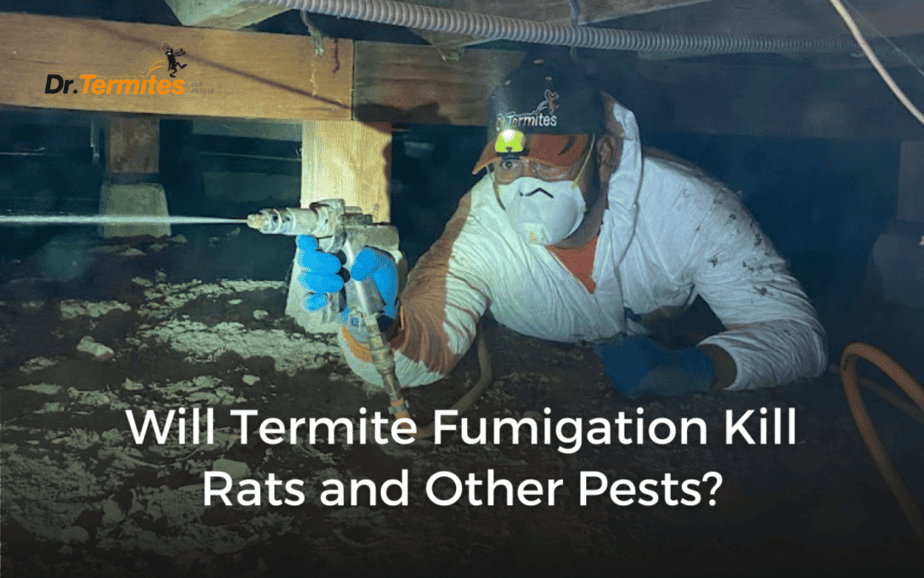
by pestcontrolseos | Apr 4, 2024 | Blog, Pest Conrol
When homeowners consider termite control, their primary concern is to protect their property from the destructive power of termites. However, homes are ecosystems that harbor various pests, including rodents like rats.
The question arises: Can the process used to eradicate termites also impact rats and additional unwanted creatures? This blog post examines the efficacy of termite fumigation in dealing with rats and other pests, providing a comprehensive overview of what homeowners can expect.
The Essence of Termite Fumigation
What is Termite Fumigation?
Termite fumigation, a pest control technique, employs gas pesticides to eliminate termites in infested structures. It’s highly effective for extensive, hidden infestations, as it reaches termites in areas otherwise inaccessible. This method ensures that even the most secluded termites are targeted, providing a comprehensive solution to termite problems.
How Does It Work?
The fumigation process involves enclosing the infested structure, often with a tent, before introducing a fumigant gas. This gas is allowed to permeate the structure for 24 to 72 hours, reaching into cracks, crevices, and wood where termites reside. This method ensures that the termites are effectively eradicated, providing a thorough solution to termite infestation by targeting their hidden sanctuaries and eliminating them completely.
Impact on Rats and Other Pests
Will Rats Be Affected?
Rats, as mammals, differ physiologically from insects such as termites. Fumigation gasses lethal to termites might not always be as effective against rats. However, if rats are inside a structure during termite fumigation, the high concentration of fumigant needed to exterminate termites could also prove fatal to rats. This highlights the importance of considering all occupants of a structure when planning fumigation treatments.
Other Pests and Considerations
Termite fumigation targets not just termites and rats but also household pests like cockroaches, bedbugs, and ants. However, its effectiveness depends on the pest’s lifecycle and fumigant concentration. To fully eradicate a range of pests, it’s often essential to employ additional, targeted pest control techniques. This ensures a comprehensive approach to pest management, addressing various life stages and species for more effective control.
Factors Influencing Fumigation Effectiveness
Sealing and Preparation
The effectiveness of fumigation in eliminating pests greatly depends on the quality of home sealing and preparation prior to commencement. Ensuring proper sealing is crucial as it guarantees the fumigant gas penetrates all possible pest-hiding places, significantly increasing the chances of a successful pest eradication process.
Concentration and Exposure Time
The effectiveness of fumigation largely depends on two critical factors: the concentration of the fumigant used and the duration of exposure. Utilizing higher concentrations and allowing for longer exposure periods significantly enhances the probability of eradicating a broader spectrum of pests, making these parameters essential for successful pest control efforts.
Integrated Pest Management (IPM)
A Holistic Approach
Integrated Pest Management (IPM) is a comprehensive approach that blends biological, cultural, physical, and chemical methods to reduce health, environmental, and financial risks. It emphasizes long-term prevention and control of various pests, such as termites and rats, aiming to achieve effective pest management while minimizing potential negative impacts. By adopting IPM strategies, we can efficiently address pest-related challenges in a sustainable and responsible manner.
Implementing IPM in Your Home
Effective pest management via Integrated Pest Management (IPM) starts with prevention. Homeowners should regularly maintain their homes to seal potential entry points and minimize moisture and clutter, which attract pests. It’s also crucial to monitor pest activity regularly. Early detection through monitoring allows for timely intervention, preventing small issues from escalating into severe infestations. Adopting these proactive measures ensures a healthier, pest-free home environment.
Maximizing Pest Control: The Role of Termite Fumigation and Integrated Pest Management Strategies
Termite fumigation is a powerful method for eradicating termites, and it can also impact rats and other pests present in the treated structure. However, its effectiveness varies depending on several factors, including the type of pest and the concentration of the fumigant. For comprehensive pest control, homeowners should consider Integrated Pest Management (IPM) strategies that address the broader spectrum of potential invaders. By combining preventive measures, regular monitoring, and targeted interventions, you can maintain a pest-free home, safeguarding your property and health.
At Dr. Termites, we specialize in offering holistic pest solutions that cater to the unique needs of your home. Our expertise in Integrated Pest Management (IPM) allows us to provide preventative strategies, precise monitoring, and targeted interventions designed to keep your home safe from termites, rats, and a variety of other pests.
Maintaining a pest-free environment is crucial for protecting your property and health. If you’re encountering pest issues or seeking to prevent future infestations, let Dr. Termites be your partner in pest control. Contact us today to schedule a consultation and learn how our services can bring peace of mind and lasting protection to your home.
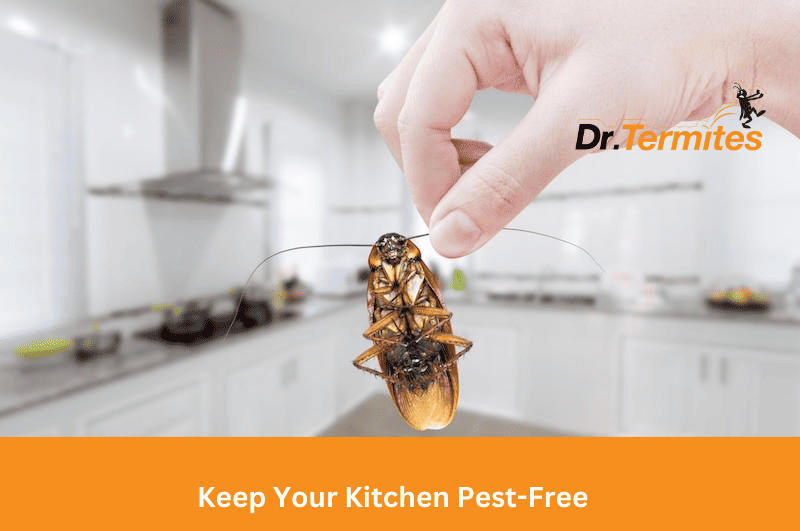
by pestcontrolseos | Jan 28, 2024 | Pest Conrol
A pest-free kitchen is beneficial to your health and necessary for upholding food safety regulations. In this post, we’ll go over some practical suggestions for how to keep your kitchen pest-free. We have covered everything from applicable pest-proofing procedures to using environmentally friendly cleaning solutions.

Pest-Proofing Your Kitchen
Installing a pest barrier is the first step in maintaining a hygienic kitchen environment. Implement the following strategies for pest-proofing your kitchen:
Seal Entry Points
Sealing any gaps or openings that pests may utilize to gain access to your home is critical. Focus on windows, doors, and pipe openings for a complete blockage that effectively keeps pests out. How to keep your kitchen pest-free includes doing this.
Proper Food Storage
Storing food in sealed containers creates a barrier that prevents pests from accessing your food supply. It helps keep your food fresh and serves as a deterrent, inhibiting bugs from staying owing to a lack of simple access.
Regular Cleaning Routine
Maintain a consistent cleaning regimen, including hard-to-reach areas behind appliances and cabinets, to create an environment that pests, including termites, rodents, and bed bugs, will avoid. Pay special attention to less apparent areas, such as behind appliances and cabinets, to create an atmosphere that pests will avoid.
Dispose of Garbage Properly
Regular waste disposal and sealed bins are crucial for proofing your kitchen. It keeps bugs from being attracted to the smell of food waste. Keeping the area around the bins clean helps to dissuade bugs from remaining in your environment. Proper garbage disposal is an integral part of how to keep your kitchen pest-free and protected against unwanted intruders.
Effective Cleaning Products For Pest Control
Keeping your kitchen clean is crucial, but choosing eco-friendly items that do not hurt the environment is also critical. Consider the following.
Natural Pest Repellents
By utilizing the power of nature, you can learn how to keep your kitchen pest-free. Natural deterrents such as mint oil, vinegar, or citrus peels can effectively deter bugs, resulting in a pest-free atmosphere that aligns with your eco-friendly values. Must Read: The Importance Of Regular Pest Inspections For Your Home
Eco-Friendly Disinfectants
You can learn how to keep your kitchen pest-free by making environmentally intelligent decisions. Choose eco-friendly or biodegradable cleaning products to prevent pests while minimizing environmental impact. These methods eliminate unwanted pests, ensuring a clean and sustainable living environment.
Chemical-Free Pest Control
Another way how to keep your kitchen pest-free is by using chemical-free pest control methods. Try using effective cleaning products like diatomaceous earth to keep bugs away. It won’t harm people or pets but is awful for insects. This way, you can have a bug-free home without putting your family or the environment at risk.
Maintaining Food Safety And Sustainability
Ensure your kitchen is not only pest-free but also adheres to sustainable practices:
Waste Reduction
Efficiently managing food resources is critical for environmental health. To reduce food waste, embrace sustainable cooking practices and create a positive impact by composting organic kitchen trash, which provides a green disposal solution.
Smart Water Usage
Be cautious of how much water you use while doing home activities. When washing dishes, use a basin to conserve water and quickly rectify any leaks, ensuring that every drop contributes to a more environmentally friendly approach to water management.
Energy-Efficient Appliances
Consider switching to more energy-efficient equipment to increase your environmental responsibilities. These assist in reducing your carbon footprint and promoting a healthier planet by conserving energy and making your daily activities more environmentally conscious.
FAQS:
What attracts pests to the kitchen?
Food and water attract pests into kitchens. Leftover crumbs, spills, and unsealed food serve as an open invitation. Keep your kitchen clean, store food in airtight containers, and address leaks as soon as possible to make it less tempting to unwelcome guests.
Are open containers more inviting to kitchen pests?
Open containers can attract pests. Bugs and creatures enjoy easy access to food, and empty containers provide an all-you-can-eat buffet. Keep everything sealed to deter bugs.
Conclusion
Safeguarding your kitchen from pests is more than ensuring food safety—it’s a commitment to a healthier and greener world! Bid farewell to these annoying visitors by implementing clever pest-proofing techniques and enlisting the help of eco-friendly cleaning warriors. Together, let’s transform our kitchens into bug-free, eco-friendly havens! Seize control with expert advice from Dr. Termites, your trusted ally in environmentally responsible pest treatment. Get ready to reclaim your kitchen with us and embrace a pest-free, ecologically sustainable future!









































